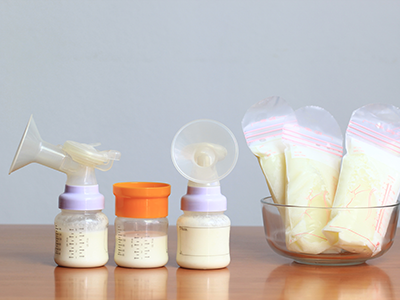If you’re breastfeeding and wondering whether your baby is getting enough milk, you’re not alone. It’s one of the most common questions new parents ask — especially in those first few days and weeks after birth. Fortunately, there are several clear signs that can help you feel confident that your baby is feeding well.
Here are three helpful ways to tell if your baby is satisfied and getting enough breast milk:
1. Watch for your baby’s feeding cues
Babies are born with natural instincts that let you know when they’re hungry. Early hunger cues include:
- Sucking motions
- Rooting (turning their head toward a touch on the cheek or searching for the breast)
- Bringing hands or fists to their mouth
It’s best to feed your baby when you notice these early signs. If you wait until your baby is crying, which is actually a late sign of hunger, it can make latching more difficult and stressful for both of you. Responding early helps establish a calm and effective feeding routine.
2. Keep your baby actively feeding
Feeding is your baby’s version of a workout! You want them to stay alert and actively suckling during the feeding session. A baby who is sleepy at the breast may not get a full feed, which can lead to fussiness later and shorter stretches of sleep.
If your baby starts to drift off before they’re done:
- Try gently tickling the soles of their feet
- Rub their cheeks or stroke their back
- Switch sides or change positions to re-engage them
It’s okay if your baby gets sleepy near the end of the feeding — that usually means they’re full. But staying active during the bulk of the session is a good sign they’re getting what they need.
3. Count wet and dirty diapers
A baby’s diaper output is one of the clearest indicators of good milk intake. In the first week of life, a simple rule of thumb is to expect at least one wet diaper per day of life:
- Day 1 = 1 wet diaper
- Day 2 = 2 wet diapers
- And so on…
Once your milk comes in, babies should have about six wet diapers and three dirty diapers per day (breastfeeding advice for today’s moms). If you notice fewer diapers than expected or very dark urine, it’s a good idea to check in with your pediatrician or a lactation consultant.
Bonus: Watch their weight and growth
It’s normal for babies to lose a little weight in the first few days after birth, but they should be back to their birth weight by about 10 to 14 days old. After that, steady weight gain is a great sign that feeding is going well.
Your baby’s doctor will track growth at regular checkups, which is why those first visits are so important. If there are concerns, they can help you troubleshoot feeding or recommend additional support.
When to reach out for help
If you’re still unsure or if your baby seems unusually sleepy, fussy or isn’t gaining weight, don’t hesitate to reach out for help! Your pediatrician is your partner in ensuring your baby is growing and thriving. Don’t hesitate to reach out with questions or concerns at any time.
If you’re navigating challenges like returning to work, check out these helpful tips: Five tips for breastfeeding and returning to work.
 https://riseandshine.childrensnational.org/wp-content/uploads/2025/12/Mom-nursing-feature.jpg
300
400
Rise and Shine
https://riseandshine.childrensnational.org/wp-content/uploads/2017/11/childrens_riseandshine_logo.jpg
Rise and Shine2025-12-04 11:29:032025-12-04 11:29:03Tips for surviving your first month of breastfeeding
https://riseandshine.childrensnational.org/wp-content/uploads/2025/12/Mom-nursing-feature.jpg
300
400
Rise and Shine
https://riseandshine.childrensnational.org/wp-content/uploads/2017/11/childrens_riseandshine_logo.jpg
Rise and Shine2025-12-04 11:29:032025-12-04 11:29:03Tips for surviving your first month of breastfeeding
















Leave a Comment
Want to join the discussion?Feel free to contribute!